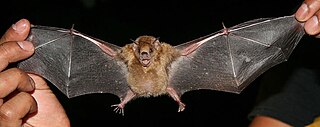
The little yellow-shouldered bat is a bat species from South and Central America. This species is a frugivore and an effective seed disperser. It roosts alone in tree cavities, on branches, vines, and under palm leaves, usually keeping to the same roosts day to day. There is evidence to suggest hypothermia is a thermoregulatory strategy to help adjust metabolic levels. In terms of mating, ambient temperature has been noted as a greater influence as compared to food availability. Its wing shape can also be affected by pregnancy in order to make flight more efficient.

The great stripe-faced bat or stripe-faced vampire bat is a bat species from South and Central America, where it is found from southern Mexico to Bolivia and northwestern Brazil, as well as on Trinidad. The great stripe-faced bat is a frugivore. It is one of two species within the genus Vampyrodes the other being Vampyrodes major.

Platyrrhinus is a genus of leaf-nosed bats in the tribe Stenodermatini of family Phyllostomidae. Twenty one species are known:

The Choco broad-nosed bat is a species of bat in the family Phyllostomidae. It is native to Colombia, Panama, and Ecuador, where it is found in the Choco region lowlands. It is threatened by habitat loss. In 2013, Bat Conservation International listed this species as one of the 35 species of its worldwide priority list of conservation.
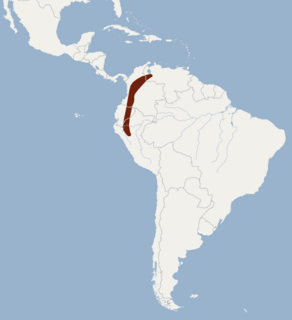
Aratathomas's yellow-shouldered bat is a species of bat in the family Phyllostomidae. It is found in Colombia, Ecuador, Peru, and Venezuela.

Sturnira known as a yellow-shouldered bat or American epauleted bat, is a genus of bat in the family Phyllostomidae. The genus name comes from the Latin for "starling" and refers to HMS Starling, which took part in an 1836 voyage to Brazil during which the type specimen was collected. It contains the following species:
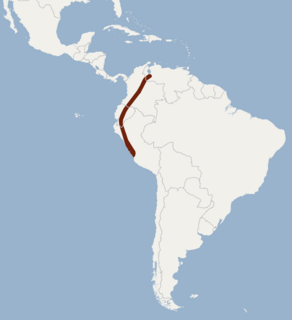
The Bogotá yellow-shouldered bat is a species of bat in the family Phyllostomidae. It is found in Colombia, Ecuador, Peru, and Venezuela at altitudes from 300 m to above 2000 m, particularly in cloud forest. The species is primarily frugivorous; it may also consume nectar and pollen.

The greater yellow-shouldered bat is a species of bat in the family Phyllostomidae. It is found in Bolivia, Colombia, Ecuador, and Peru.

The lesser yellow-shouldered bat is a species of bat in the family Phyllostomidae. It is native to Peru and Ecuador. It is threatened by habitat loss.
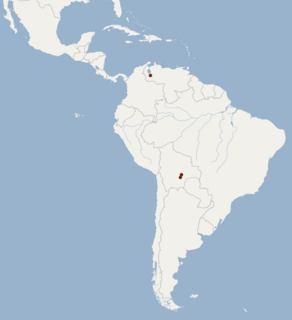
Soriano's yellow-shouldered bat, is an extant species of leaf-nosed bat indigenous to Bolivia and Venezuela, although its precise distribution is uncertain. Following the postulation of the species in 2005, S. sorianoi requires contemporary information relating its distribution, environment, and population, along with formal a comparison with S. erythromos and S. bogotensis. Without sufficient data, the International Union for Conservation of Nature (IUCN) presently considers the taxonomy for S. sorianoi as incomplete.

The western round-eared bat is a bat species found only on the Pacific coast of northwestern Ecuador.
The slender broad-nosed bat is a species of bat in the family Phyllostomidae. As a phyllostomid bat, it is characterized by a narrow uropatagium which is fringed with hair; a white dorsal stripe; large inner upper incisors convergent at the tips; and three upper and three lower molars. It is found in eastern Colombia and Ecuador, north-eastern Peru, and Venezuela. It is closely related to Platyrrhinus incarum and Platyrrhinus fusciventris.

The brown-bellied broad-nosed bat is a species of bat in the family Phyllostomidae. As a phyllostomid bat, it is characterized by a narrow uropatagium which is fringed with hair; a white dorsal stripe; large inner upper incisors convergent at the tips; and three upper and three lower molars. It is found in Guyana, Suriname, French Guiana, Trinidad and Tobago, northern Brazil, eastern Ecuador, and southern Venezuela. It is closely related to Platyrrhinus incarum and Platyrrhinus angustirostris.
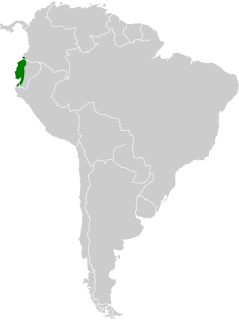
The Matapalo broad-nosed bat, Platyrrhinus matapalensis, is a species of leaf-nosed bat described in 2005. It is found in South America.

Platyrrhinus ismaeli is a species of bat found in South America.
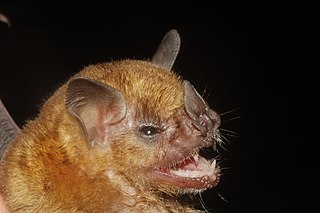
Sturnira honurensis is a species of bat found in Central America. Previously, it was considered a subspecies of the highland yellow-shouldered bat, but it has been considered distinct since 2010.
Burton's yellow-shouldered bat is a species of leaf-nosed bat found in Panama and Costa Rica.

Sturnira koopmanhilli is a species of leaf-nosed bat found in South America.

Sturnira parvidens is a species of leaf-nosed bat found in Central America.
Sturnira angeli, also known as the Guadeloupe yellow-shouldered bat or Angel's yellow-shouldered bat, is a species of bat in the family Phyllostomidae. It is endemic to the Lesser Antilles. As of 2018 it is listed as near threatened by the IUCN.


















